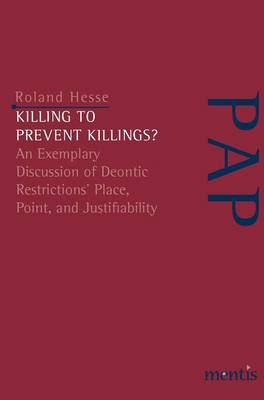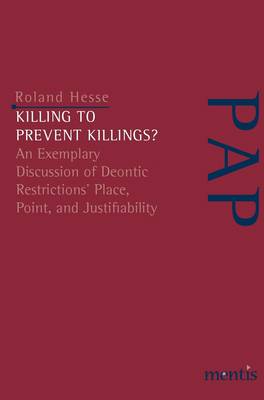
Bedankt voor het vertrouwen het afgelopen jaar! Om jou te bedanken bieden we GRATIS verzending (in België) aan op alles gedurende de hele maand januari.
- Afhalen na 1 uur in een winkel met voorraad
- In januari gratis thuislevering in België
- Ruim aanbod met 7 miljoen producten
Bedankt voor het vertrouwen het afgelopen jaar! Om jou te bedanken bieden we GRATIS verzending (in België) aan op alles gedurende de hele maand januari.
- Afhalen na 1 uur in een winkel met voorraad
- In januari gratis thuislevering in België
- Ruim aanbod met 7 miljoen producten
Zoeken
Killing to Prevent Killings?
An Exemplary Discussion of Deontic Restrictions' Place, Point, and Justifiability
Roland Hesse
€ 135,45
+ 270 punten
Omschrijving
Is it permissible to kill an innocent person against her will in order to prevent several other innocent persons from being killed against their will? The answer to which this essay comes after extensive discussion is - under certain conditions and limitations - affirmative. On the way to this answer, the book offers a comprehensive in-depth discussion of so-called deontic restrictions - that is, the idea of an action's being prohibited in circumstances in which performing it once would be the only way to prevent its being performed multiple times. The book's leading question is whether there is a plausible rationale for deontic restrictions. To this effect, a taxonomy and critical discussions of the most important approaches to justify deontic restrictions are provided - where many of these approaches undergo a deeper examination for the first time ever. In addition, the book clarifies some adjoining questions, such as why deontic restrictions are often perceived as being problematic or how the concept of agent-relativity should best be understood and formalized. Put into broader perspective, the conclusions offered should have a bearing on a number of debates in normative ethics, not least on the debate between deontologists and consequentialist.
Specificaties
Betrokkenen
- Auteur(s):
- Uitgeverij:
Inhoud
- Aantal bladzijden:
- 202
- Taal:
- Engels
- Reeks:
Eigenschappen
- Productcode (EAN):
- 9783957431929
- Verschijningsdatum:
- 1/03/2020
- Uitvoering:
- Paperback
- Formaat:
- Trade paperback (VS)
- Afmetingen:
- 155 mm x 235 mm
- Gewicht:
- 352 g

Alleen bij Standaard Boekhandel
+ 270 punten op je klantenkaart van Standaard Boekhandel
Beoordelingen
We publiceren alleen reviews die voldoen aan de voorwaarden voor reviews. Bekijk onze voorwaarden voor reviews.









